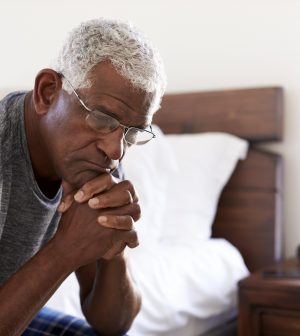- Does the Water in Your House Smell Funny? Here’s Why
- Can a Daily Dose of Apple Cider Vinegar Actually Aid Weight Loss?
- 6 Health Beverages That Can Actually Spike Your Blood Sugar
- Treatment Options for Social Anxiety Disorder
- Understanding the Connection Between Anxiety and Depression
- How Daily Prunes Can Influence Cholesterol and Inflammation
- When to Take B12 for Better Absorption and Energy
- Epsom Salts: Health Benefits and Uses
- See What Saffron Can Do for Sleep and Heart Health
- 6 Common Mistakes to Avoid Before Your Physical
Am I Depressed? The Most Common Symptoms to Look Out For

Think you might be struggling with depression? It’s not always easy to recognize, but identifying the symptoms is the first step toward getting the help you need.
Depression is a common mental health condition that affects millions of people worldwide. In the United States alone, an estimated 21 million adults had at least one major bout of depression in 2020, representing about 8.4% of the adult population, according to the U.S. National Institute of Mental Health (NIMH). Symptoms of depression vary from person to person, but some are more commonly experienced than others.
Exploring the most common symptoms will help you know what to look for if you suspect that you or someone you know may be struggling with depression.
What are symptoms of depression?
Craig Sawchuk, a clinical psychologist at the Mayo Clinic in Rochester, Minn., said “understanding the basics of depression can help you take the next step.” In a Mayo Clinic video, he noted: “Depression is a mood disorder that causes feelings of sadness that won’t go away … and people who experience depression can’t just snap out of it.”
Depression can show up in many ways and can affect each person differently. But some common symptoms are associated with this condition. They can range from feeling persistently sad or hopeless to losing interest in activities you once enjoyed. Other symptoms may include changes in appetite, sleep disturbances and difficulty concentrating.
According to the NIMH, these are common symptoms of depression:
- Persistent feelings of sadness, anxiety or emptiness that do not go away
- A constant sense of hopelessness or negativity
- Unexplained irritability, frustration or restlessness
- Overwhelming feelings of guilt, worthlessness or helplessness
- Loss of interest or enjoyment in activities that used to be pleasurable
- Persistent feelings of exhaustion, fatigue or being slowed down
- Difficulty concentrating, remembering things or making decisions
- Changes in sleep patterns, such as difficulty falling asleep, waking up early or sleeping too much
- Unplanned changes in appetite that lead to weight gain or loss
- Unexplained physical symptoms, such as cramps, digestive issues or headaches that don’t respond to typical treatment
- Thoughts of suicide or death, or attempting suicide.
Have you lost interest in activities?
While any of the above symptoms can be warning signs of depression, one of the more easily recognizable symptoms is a loss of interest in activities you once enjoyed.
It’s not uncommon for people with depression to feel this way. But losing interest in activities generally can lead to a lack of physical activity, negatively impacting your overall health. According to the U.S. Centers for Disease Control and Prevention, being physically active can improve your mental health, reduce your risk of chronic diseases and even help you live longer.
Exercise releases endorphins, which are feel-good chemicals in the brain that can help boost your mood and reduce feelings of stress and anxiety. When people engage in activities they enjoy, they’re more likely to stay active, mentally focused and have a sense of purpose. In addition, staying active and engaging can help combat depression symptoms. Activities that involve social interaction can help alleviate feelings of loneliness and isolation, which are common among people with depression.
Anxiety versus depression: What’s the difference?
Feeling anxious is also a common symptom of depression, but sometimes, these two conditions can be confused. According to an article for PSYCOM written by licensed professional counselor Kathleen Smith, anxiety is characterized by feelings of worry, nervousness or unease about a future event or situation.
Depression, on the other hand, is characterized by persistent feelings of sadness, hopelessness and lack of interest in activities. While they have different symptoms, anxiety can also be a sign of depression. In fact, the same article pointed out that many people with depression also experience anxiety. Therefore, if you’re experiencing symptoms of anxiety, it’s essential also to consider whether you may be struggling with depression.
Recognizing depression symptoms is the first step toward getting help
If you are experiencing symptoms of depression, it’s important to remember that you’re not alone, and help is available. Recognizing these symptoms and seeking support can be the first step toward feeling better. Whether it’s reaching out to a trusted friend or family member, making an appointment with a mental health professional, or contacting a crisis hotline, addressing your feelings is crucial. By seeking help, you can start to manage your symptoms and improve your overall well-being. Don’t wait to get the support you need.
Copyright © 2026 HealthDay. All rights reserved.










